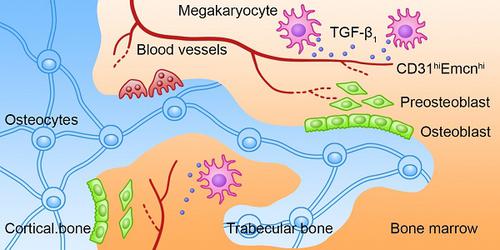Theranostics ( IF 12.4 ) Pub Date : 2020-01-01 , DOI: 10.7150/thno.40559 Yong Tang 1 , Mengjia Hu 1 , Yang Xu 1 , Fang Chen 1 , Shilei Chen 1 , Mo Chen 1 , Yan Qi 1 , Mingqiang Shen 1 , Cheng Wang 1 , Yukai Lu 1 , Zihao Zhang 1 , Hao Zeng 1 , Yong Quan 1 , Fengchao Wang 1 , Yongping Su 1 , Dongfeng Zeng 1 , Song Wang 1 , Junping Wang 1

|
Rationale: The hematopoietic system and skeletal system have a close relationship, and megakaryocytes (MKs) may be involved in maintaining bone homeostasis. However, the exact role and underlying mechanism of MKs in bone formation during steady-state and stress conditions are still unclear.
Methods: We first evaluated the bone phenotype with MKs deficiency in bone marrow by using c-Mpl-deficient mice and MKs-conditionally deleted mice. Then, osteoblasts (OBs) proliferation and differentiation and CD31hiEmcnhi tube formation were assessed. The expression of growth factors related to bone formation in MKs was detected by RNA-sequencing and enzyme-linked immunosorbent assays (ELISAs). Mice with specific depletion of TGF-β1 in MKs were used to further verify the effect of MKs on osteogenesis and angiogenesis. Finally, MKs treatment of irradiation-induced bone injury was tested in a mouse model.
Results: We found that MKs deficiency significantly impaired bone formation. Further investigations revealed that MKs could promote OBs proliferation and differentiation, as well as CD31hiEmcnhi vessels formation, by secreting high levels of TGF-β1. Consistent with these findings, mice with specific depletion of TGF-β1 in MKs displayed significantly decreased bone mass and strength. Importantly, treatment with MKs or thrombopoietin (TPO) substantially attenuated radioactive bone injury in mice by directly or indirectly increasing the level of TGF-β1 in bone marrow. MKs-derived TGF-β1 was also involved in suppressing apoptosis and promoting DNA damage repair in OBs after irradiation exposure.
Conclusions: Our findings demonstrate that MKs contribute to bone formation through coupling osteogenesis with angiogenesis by secreting TGF-β1, which may offer a potential therapeutic strategy for the treatment of irradiation-induced osteoporosis.
中文翻译:

巨核细胞通过分泌TGF-β1使成骨与血管生成结合来促进骨骼形成。
理由:造血系统和骨骼系统有密切关系,并且巨核细胞(MKs)可能参与维持骨稳态。然而,在稳态和压力条件下,MKs在骨形成中的确切作用和潜在机制仍不清楚。
方法:我们首先使用c-Mpl缺陷型小鼠和MKs条件删除的小鼠评估了骨髓中MKs缺乏的骨表型。然后,评估成骨细胞(OBs )的增殖和分化以及CD31 hi Emcn hi管的形成。通过RNA测序和酶联免疫吸附试验(ELISA)检测MK中与骨形成相关的生长因子的表达。MKs中具有特定消耗TGF-β1的小鼠被用于进一步验证MKs对成骨和血管生成的作用。最后,在小鼠模型中测试了MKs治疗辐照引起的骨损伤。
结果:我们发现MKs缺乏症严重损害了骨形成。进一步的研究表明,MKs可以通过分泌高水平的TGF-β1来促进OBs的增殖和分化以及CD31 hi Emcn hi血管的形成。与这些发现一致的是,MKs中TGF-β1特异性耗竭的小鼠表现出明显降低的骨量和强度。重要的是,通过直接或间接增加骨髓中TGF-β1的水平,用MK或血小板生成素(TPO)进行的治疗可大大减轻小鼠的放射性骨损伤。源自MKs的TGF-β1还参与了放射线照射后OB中抑制凋亡和促进DNA损伤修复。
结论:我们的发现表明,MKs通过分泌TGF-β1将成骨与血管生成结合而促进了骨形成,这可能为放射线诱发的骨质疏松症的治疗提供了潜在的治疗策略。



























 京公网安备 11010802027423号
京公网安备 11010802027423号